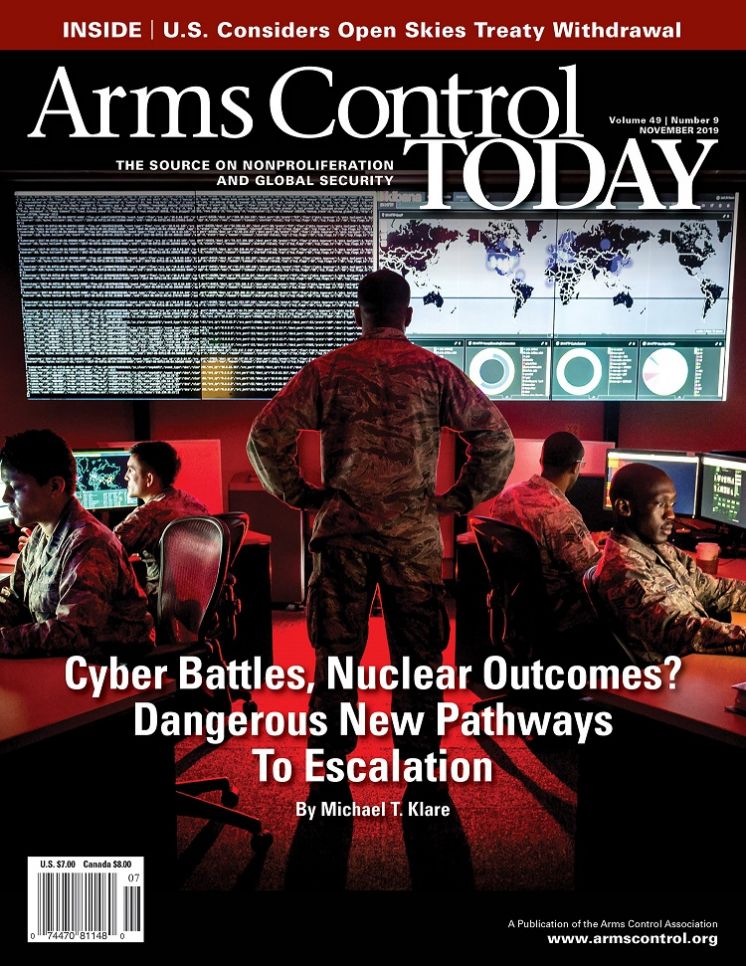Arms Control Today, News in Brief, November 2019
The publication of the News in Brief section of Arms Control Today magazine is a joint project of the Center for International Security and Policy and The Arms Control Association.
U.S. Alleges New Syrian Chlorine Attack
U.S. officials have confirmed the United States believes that Syria once again has used chlorine-based weapons, this time in a May 2019 strike in Syria’s Latakia Province. According to The Wall Street Journal, the U.S. intelligence assessment indicates that the May 19 attack was conducted by Syrian President Bashar al-Assad’s forces and killed at least four people.
The 1997 Chemical Weapons Convention (CWC), to which Syria acceded in 2013, prohibits the production, stockpiling, transfer, and use of chemical weapons. A joint investigative mechanism led by the treaty’s Organisation for the Prohibition of Chemical Weapons (OPCW) and the United Nations has verified the sporadic but regular use of chemical weapons and of other toxic chemicals, including chlorine, in Syria since 2014.
Although the OPCW defines chemical weapons as “any chemical intended for chemical weapons purposes” and includes chlorine on a list of chemical choking agents, chlorine gas is a dual-use chemical and not a scheduled agent explicitly banned by the CWC. Consequently, the Syrian government’s supplies of chlorine were not part of the OPCW-led removal and destruction of Syria’s sarin and mustard arsenal and precursor chemicals, executed shortly after Syria’s accession to the CWC. (See ACT, December 2014.) – JULIA MASTERSON
China Considers Joining ATT
China expressed an interest in becoming a party to the Arms Trade Treaty (ATT) at the 74th session of the UN General Assembly on Sept. 27.
In a prepared speech, Foreign Affairs Minister Wang Yi stated that his country had “initiated the domestic legal procedures to join” the treaty. Shortly afterward, Foreign Ministry spokesperson Geng Shuang clarified that China is “striving for its accession to the ATT at an early date.”
China previously released a statement expressing an interest in joining the ATT on April 30, following U.S. President Donald Trump’s public rejection of the agreement. The treaty had been signed in September 2013 by the Obama administration but never ratified. At an April 26 event hosted by the National Rifle Association, Trump announced that he was withdrawing the United States from the treaty, claiming that it would allow “foreign bureaucrats” to “trample” on freedoms guaranteed by the Second Amendment of the U.S. Constitution.
The ATT, which entered into force on Dec. 24, 2014, establishes international standards designed to prevent illegal arms sales and sales of arms that could be used in the commission of genocide, war crimes, and other violations of international humanitarian law. It requires states-parties to create a domestic arms trade accounting system, regulate the brokering of weapons within their territory, report regularly on treaty implementation, and decline arms sales under certain conditions.
China's accession to the ATT, which now has 105 states-parties, would be significant because it is one of the world’s five largest global arms exporters. – OWEN LeGRONE
CD Fails to Adopt Program of Work
For the 10th consecutive year, the Conference on Disarmament (CD) concluded in mid-September without reaching consensus on the adoption of a program of work.
The final report on the conference stated that throughout the 2019 session, successive CD presidents “conducted intensive consultations with a view to reaching a consensus on a program of work,” but despite those efforts, they “did not succeed.” Since the Comprehensive Test Ban Treaty opened for signature in 1996, the 65-member, Geneva-based CD has managed to adopt a program of work only twice, in 1998 and 2009.
The 2019 session involved 48 formal plenary meetings and 16 informal meetings. In February, UN Secretary-General Antonio Guterres urged states to overcome their differences and warned that “key components of the international arms control architecture are collapsing.” He specifically referenced the Intermediate-Range Nuclear Forces Treaty, which ultimately collapsed in August, and the New Strategic Arms Reduction Treaty, which is scheduled to expire in February 2021. “I urge you in the strongest possible terms to take a decisive action to safeguard and preserve the existing system through dialogue that will help restore trust,” Guterres said.
In addition to Guterres, representatives from nearly 40 countries addressed the conference over the course of the 2019 session, including the United States and Russia. All these dignitaries, according to the final report, “expressed concern about the Conference’s current situation.”
The CD’s permanent agenda contains 10 items, but there are four core issues: nuclear disarmament, a treaty banning the production of fissile material, the prevention of an arms race in outer space, and negative security assurances. The current deadlock is largely attributed to disagreements between members about the prioritization of those issues and attempts to link progress on one issue to progress on another. – SHANNON BUGOS

